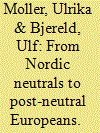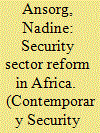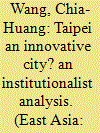| Srl | Item |
| 1 |
ID:
101470


|
|
|
|
|
| Publication |
2010.
|
| Summary/Abstract |
This article analyses the foreign policy of two post-neutral EU member states, Sweden and Finland. Both these Nordic states have adjusted their past policies of neutrality in favour of extended participation in the European and transatlantic security community. Yet within a similar and comparable pattern of change, there are two very significant differences between them: their views towards future membership in NATO and their choice of military strategy. The article utilizes an analytical framework that treats neutrality as an institutionalized idea containing causal and principled beliefs. The persistence of neutrality as a guiding principle of policy depends on feedback regarding: (1) its strategic usefulness (implications for security) as well as (2) its social appropriateness (implications for identity). The feedback mechanisms are related in the sense that the self-interested element of military non-alignment for the sake of security needs to be compensated by an appropriate role, such as demonstrating responsibility and engagement in international issues. Having taken a more autonomous decision, although with a historical record of shortcomings as regards declared neutrality, Sweden has been more dependent than Finland in ensuring that its respective policy of neutrality is complemented by an appropriate international role. This was possible during the Cold War, yet became increasingly difficult after the collapse of the bipolar world order. Thus, the analysis undertaken suggests, paradoxically, that in order to remain militarily non-aligned, Sweden has come to favour a more European outlook at the expense of the integrity of its policy of neutrality.
|
|
|
|
|
|
|
|
|
|
|
|
|
|
|
|
| 2 |
ID:
081819


|
|
|
| 3 |
ID:
152384


|
|
|
|
|
| Summary/Abstract |
Many African states have security sector reform (SSR) programs. These are often internationally funded. But how do such programs account for previously existing security institutions and the security needs of local communities? This article examines SSR all over Africa to assess local ownership and path dependency from a New Institutionalist perspective. It finds that SSR, particularly in post-conflict countries, tends to be driven by ideas and perceptions of international donors promoting generalized blueprints. Often, such programs only account in a very limited way for path-dependent aspects of security institutions or the local context. Hence, the reforms often lack local participation and are thus not accepted by the local community eventually.
|
|
|
|
|
|
|
|
|
|
|
|
|
|
|
|
| 4 |
ID:
080463


|
|
|
|
|
| Publication |
2007.
|
| Summary/Abstract |
This paper explores whether Taipei is an innovative city by critically examining Taipei's industrial and economic performance, developmental visions and spatial planning, as well as institutional settings and political contexts. With the aid of institutionalist perspective, the author argues that Taipei's innovative efforts are mostly policy innovation, rather than institutional innovation. The author also describes the institutional dynamics that have caused the lack of Taipei's institutional innovation. The case study of Taipei could be helpful in conducting comparative studies on urban innovation
|
|
|
|
|
|
|
|
|
|
|
|
|
|
|
|